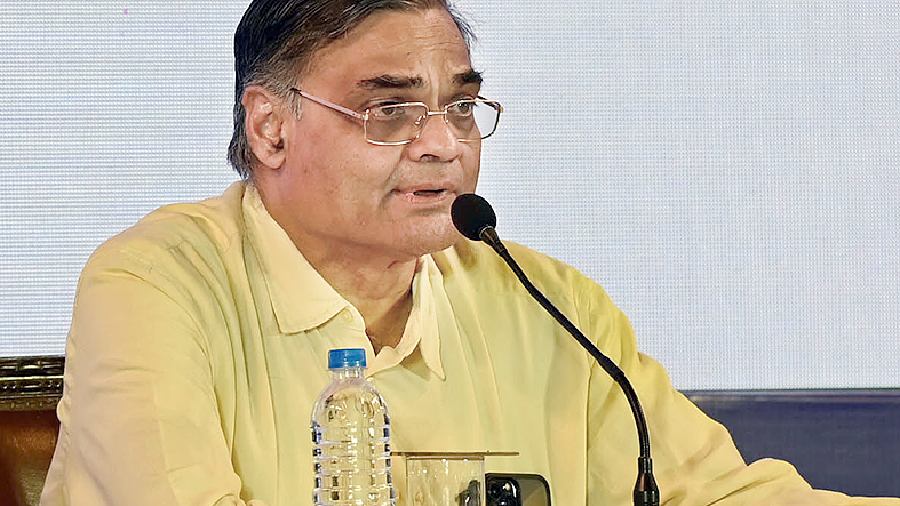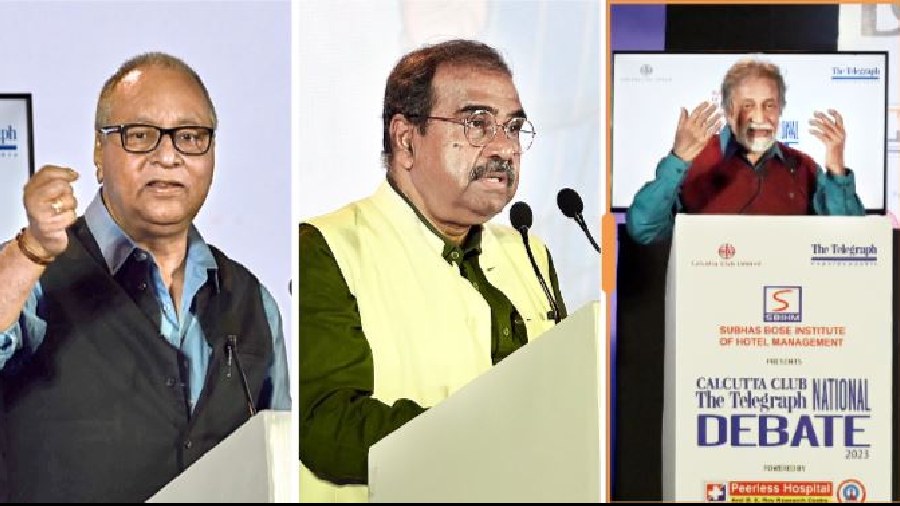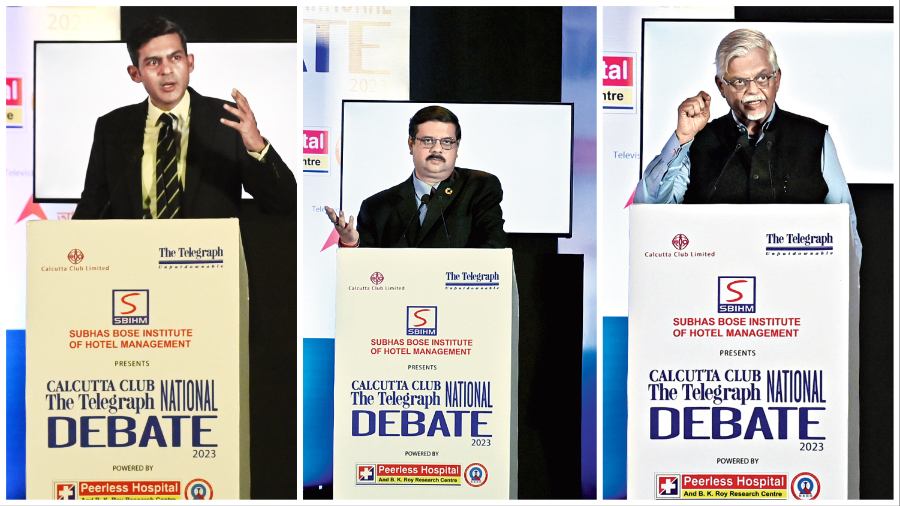WHAT: Subhas Bose Institute of Hotel Management presents Calcutta Club The Telegraph National Debate 2023 powered by Peerless Hospital and BK Roy Research Centre.
WHERE: The Calcutta Club Lawns.
MOTION: Cronies are breaking capitalism.
VERDICT: The motion was tied after a show of hands.
FOR THE MOTION
JAWHAR SIRCAR
Rajya Sabha MP and former bureaucrat
I joined the service in 1975. Two years later, it would be 50 years. In 50 years, I have not seen such depredations of the public economy. I have not seen such amounts of individual enrichment that were rewarded rather than punished. Those who raise a voice are sent to jail. It is happening. It is not one of those melodramatic sentences from a Bengali movie.
Why does it happen? It happens because the interests of the cronies are surely more than the interest of anyone else in India. The interest of the cronies is more important to the ruler because it is from them that he draws sustenance. By sustenance, I mean moolah, not the Bengali one.
What has been happening since 2014 is an elevation of expenditure and a blitzkrieg in electioneering that we have never seen before. I conducted two parliamentary elections in Bengal. It’s beyond the wildest of imaginations. Everything has been ramped up beyond the affordability of any political party. To claim such an unaffordable system, you need a steady accretion of wealth. In order to do that, you must enrich the crony concerned.
Why do we have to come to Calcutta Club to say this? I have to come to Calcutta Club because for the past 14 days, morning and afternoon, we went to the Rajya Sabha and the Lok Sabha, and within five minutes there was shouting, ‘Modi Modi, Rahul-Rahul’. Within five minutes, the House was adjourned till 2pm. We went at 2pm. Again, ‘Modi-Modi, Rahul-Rahul’. It was adjourned. It was done deliberately so that no discussion is possible. Those who dared to discuss would be put behind bars.
The Enforcement Directorate does 3,500 raids in nine years. How many people are convicted? Nine. What ludicrous facts are we going through? This sort of a systematic destruction of public policy and economics is leading to only one fact. That we are heading towards an autocracy from which there is no escape.
AGAINST
RUDRA CHATTERJEE
Managing director, Luxmi Group
Cronyism is bad. Cronies are friends with benefits, hopefully just pecuniary benefits, between the capitalist and the government. But capitalism has also lasted for a long time. Many attacks have made it more resilient and adaptable.
I will try to show with evidence that cronyism is not a threat to the survival of capitalism. The Economist magazine comes up with a crony capitalism index. It ranks the countries in the order of their misdeeds. The World Economic Forum has something called the competitiveness index, which shows how vibrant the free market economy is.
Hearing the first speaker (Sircar), one would expect that cronyism should break capitalism and that there should be an inverse correlation between the two indexes. Ladies and gentlemen, no such correlation exists. In fact, Singapore, which according to the World Economic Forum is the most competitive economy in the world, ranks just behind Russia in cronyism. So, cronyism is bad. But capitalism survives.
Ambition, not favour, is the currency of capitalism. Innovation is the currency of capitalism. Let nobody make you believe otherwise.
Veteran members of the Calcutta Club, do you remember Kolkata in its heyday? When it was an economic powerhouse with large companies. Was it cronyism that drove away business or gheraos? Was it cronyism that took away the jobs? Ladies and gentlemen, the natural habitat of cronyism is the mai-baap licence raj, where the businessman and the government exchange favours. I use the word natural habitat in the sense that the silverback gorilla loves the darkness and the shade of African rainforests. So do cronies. The sunlight that free markets bring kills cronyism. And if it doesn’t, it at least doesn’t break capitalism.
I would just like to end by talking to the people of Kolkata. Business requires hard work, requires ambition. It also requires society to back you. Please don’t turn business into a media spectacle. Please don’t make it look like a colosseum where lions feed.
FOR
ABHIRUP SARKAR
Economist
Why is capitalism not working in a country like India?
When capitalism is working, the keyword is competition. Through competition we allocate resources efficiently. We allocate resources to the best user. And here comes cronyism. When you have cronies, these are people who have good friends with the government. They get immense favours from the government. Access to government funds, tax breaks, waivers from environmental laws, access to public resources. Most important, entry. No more entry is allowed. So competition is restricted. And that is the source of inefficiency. That is the reason why capitalism gets thwarted.
A crony capitalist is not necessarily interested in reinvestment. The whole process of capitalism depends on reinvestment of profits. But a crony is not sure whether he will have the same kind of good terms with the next government. So he will divert funds to some faraway country where laws are lax. So there is little investment. Cronyism itself is affecting the process of growth and development.
Now the question is why in a democratic setup, the democractic process itself cannot get rid of cronyism? After all, we have regular elections and if a large number of the population is outside the process of development why can’t these people vote differently, vote out the inefficient government?
The reason is that a completely false cultural insecurity of the majority has been inflicted on us. The focus has shifted from economic issues to even cultural or religious issues. At the same time, institutions like the judiciary, police, the central bank, they have been destroyed.
Miseducation is being spread and information is being suppressed. National agencies which collected information and which were reputable have been made defunct. Most important, opposing voices are suppressed. This is how cronyism is getting a permanency all over the world and I am concerned because all these symptoms are there in the Indian socio-politcal setup. If it is allowed to work, capitalism is the best system that humans have invented. But if we have cronyism, we restrict competition and that’s the end of capitalism.
AGAINST
KOUSHIK CHATTERJEE
Executive director and chief financial officer, Tata Steel
I come from a capitalist world where the founding fathers of the Tata Group enshrine the principles of ‘what comes from the society must go back to the society’. To me, that is what capitalism is best defined.
By definition, cronyism is not just associated with capitalism. Cronyism is associated with the people in power and all that goes negative for the society.
The term cronyism first came in during the Asian financial crisis in 1997 when most of the southeast Asian countries went through a financial crisis and many academic research has happened after that to find out what was the fundamental reasons for that crisis. One of the issues that came up was the misapplication, misallocation of capital, the lack of rules and regulation for providers of capital and hence there was an abundance of capital used in the wrong way. And when the time came for a payback, it just failed.
The foundations of capitalism have been over decades built on the efficiency of deployment of capital and circularity of capital. You can get capital once but if you are not efficient in the deployment and return you cannot get back to the financial markets and take capital again.
As capitalism has progressed, the governance protocols have progressed, disclosure standards have progressed, the allocation measurements have progressed and, by and large, capitalism has been strengthened with every failing that has been noticed across the world.
Capital is accountable and that accountability raises the standards. Cronyism is a misadventure which is vulnerable, which has got a very short shelf life and got huge costs in terms of reputation and the ability to build institutions that will sustain.
In a free economy, if a country has to grow, only public taxpayers’ money is not enough. We have to attract capital, and private capital.
India is a capital deficient country and if we have aspirations, all of us as citizens, we have to attract global capital. And global capital is a very conscious capital. It is built on a few tenets. One, it is ethical capital, it is capital that looks at environmental sustainability, it looks at social leadership and it looks at authenticity of governance, not just ticking the box.
The capital that India needs can’t be from yours and mine savings. As India is getting integrated in trade and finance, that global capital is asking the right questions..
FOR
PRABHAT PATNAIK
Professor emeritus, Centre for Economic Studies, JNU
Within capitalism, there are certain rules of the game. Those rules of the game do not necessarily entail equality of opportunity for everybody. Still, there are rules. Crony capitalism entails a violation of the rules of the game. We have to be very specific in identifying crony capitalism and not simply talk about inequality and contacts working out.
We have to distinguish between crony capitalism and normal capitalism and the only distinction can be violation of the rules of the game of capitalism which cronyism generally entails.
Why is it that there is no opposition to it from within the ranks of the capitalists? An answer was given by Rahul Bajaj who, in the presence of Amit Shah, once actually said — it was a meeting of the big capitalists — in which he actually said all of them are scared.
Fear is an obvious factor, which plays in the minds of even normal capitalists. This fear is possible, not just among the capitalists; suppression of civil society becomes an important component in sustaining cronyism.
Cronyism is cancer. The point about cronyism is that it arises in only certain conjunctures. It arises in close proximity with, in close association with fascism or neo-fascism. You may ask what is wrong with cronyism? After all, they also make investments.
Fundamentally, what is wrong with cronyism is that cronyism is based on an under-evaluation of risks. That you give loans not calculating the risks of giving a loan. You give because the government has asked you to.
Similarly, you allow an investment to occur somewhere not taking into account the risks associated with it, but because the government has asked you to do it. In other words, it is based on an under-evaluation of risks. Capitalism is concerned with the right evaluation of risks.
This is exactly what happened with the Housing Bubble. If you have under evaluation of risks then the slightest blow to the crony leads to the collapse of the entire financial system.
AGAINST
SANJAYA BARU
Columnist, author and media adviser to then Prime Minister Manmohan Singh
The capitalist development that has happened in the country in the last 75 years has been done within the framework of cronyism.
Cronyism has not broken capitalism in this country, it has built capitalism. Cronyism was the process through which politicians and businessmen came together in the name of nationalism.I have an episode on my PhD thesis that Dr Patnaik supervised. There, I quoted a letter from G.D. Birla to Babu Rajendra Prasad, later the President of India. In 1938, the Indian Sugar Syndicate ran their syndicate to fix prices. He said ‘I want support from the Congress party and the provincial government’ and issued a cheque of Rs 10,000 to Babu Rajendra Prasad, saying “Thank you for your services rendered”.
But there is an interesting fact that we need to understand. Till 1990, you take the top 100 business groups, from 1960... There was hardly any change. Then we hada de-regulation, de-licensing in 1991. And that top hundred is completely shaken by 2000.
It was a period of change, it was a period of genuine competition, entry of the new enterprise that Dr Patnaik spoke about. But why are we today worried about crony capitalism? It is because of the reversal of that process.
That process of opening up, liberalisation, competition, the growth of enterprise, that we saw on the ground between 1991 and, I would say, till about 2011-12, a 20-year period. There is a reversal of that process.
Today, we see the kind of problem where an individual businessman has become so powerful that we do not know the relationship between one and the other.
At least, we knew Birladid have to go to Indiraji for a licence. Today, one does not know whether A is going to Mor M is going to A.
In other words, the inter-relationship has become far more complex. I think that is the turn that Indian politics and Indian business has taken which is not in the good interest of the country. This cronyism is fundamentally different from the kind of cronyism we have seen in the past.

MODERATOR: Sandip Chatterjee

FOR THE MOTION: Jawhar Sircar, Abhirup Sarkar, Prabhat Patnaik







